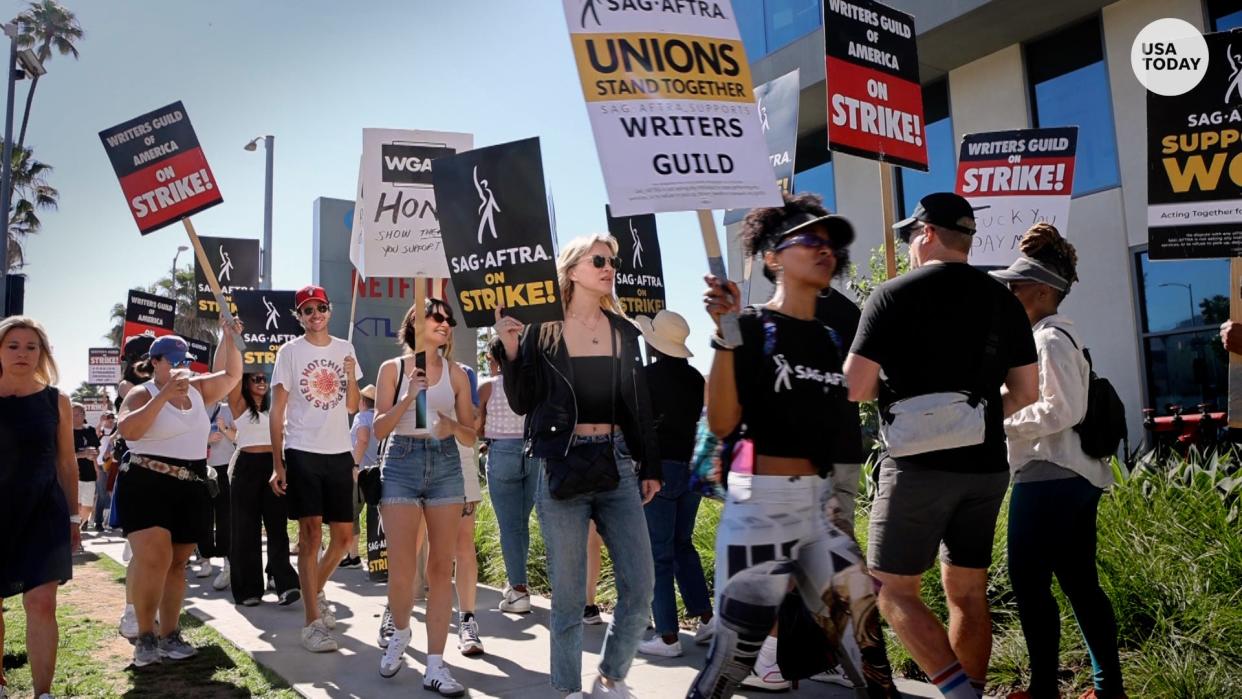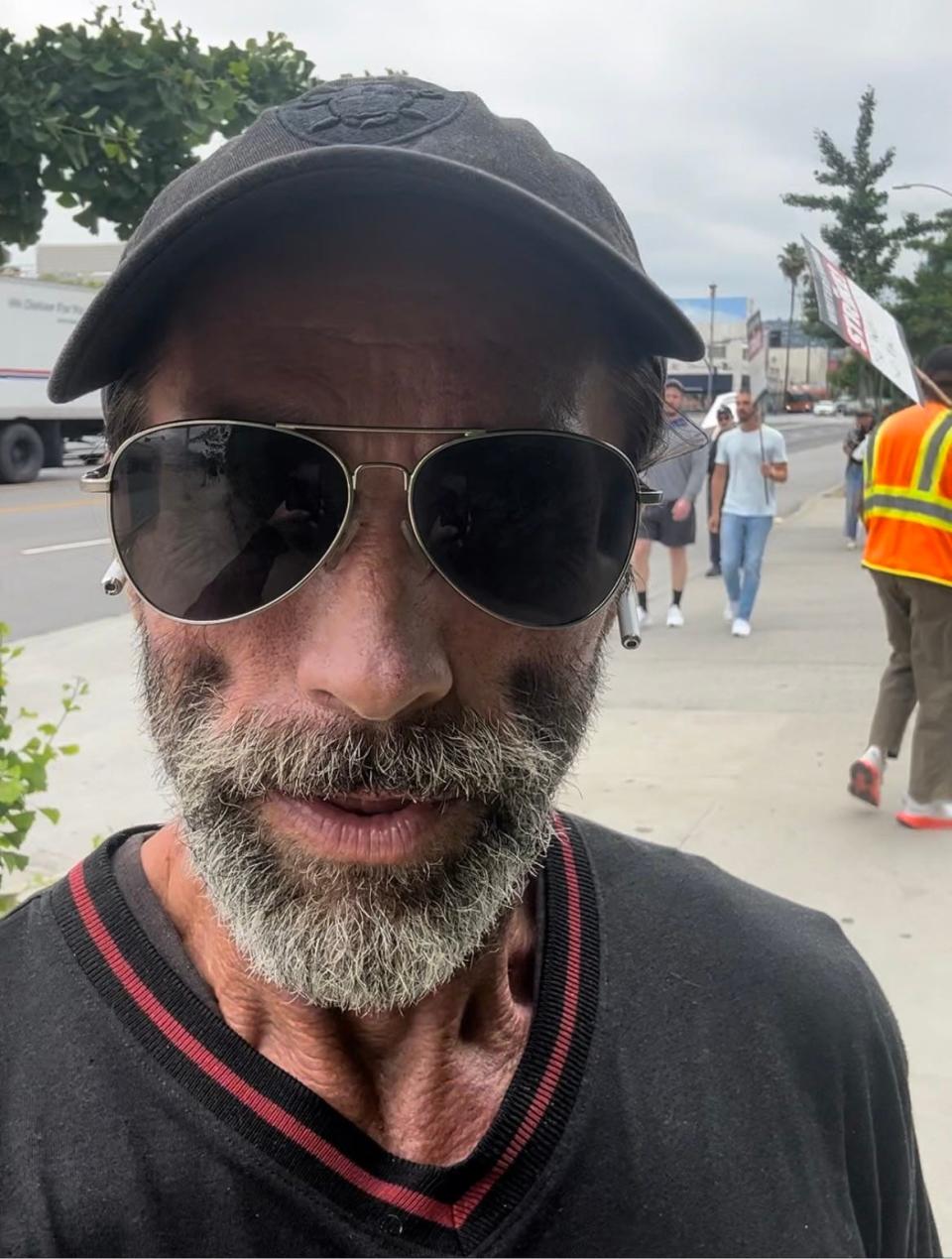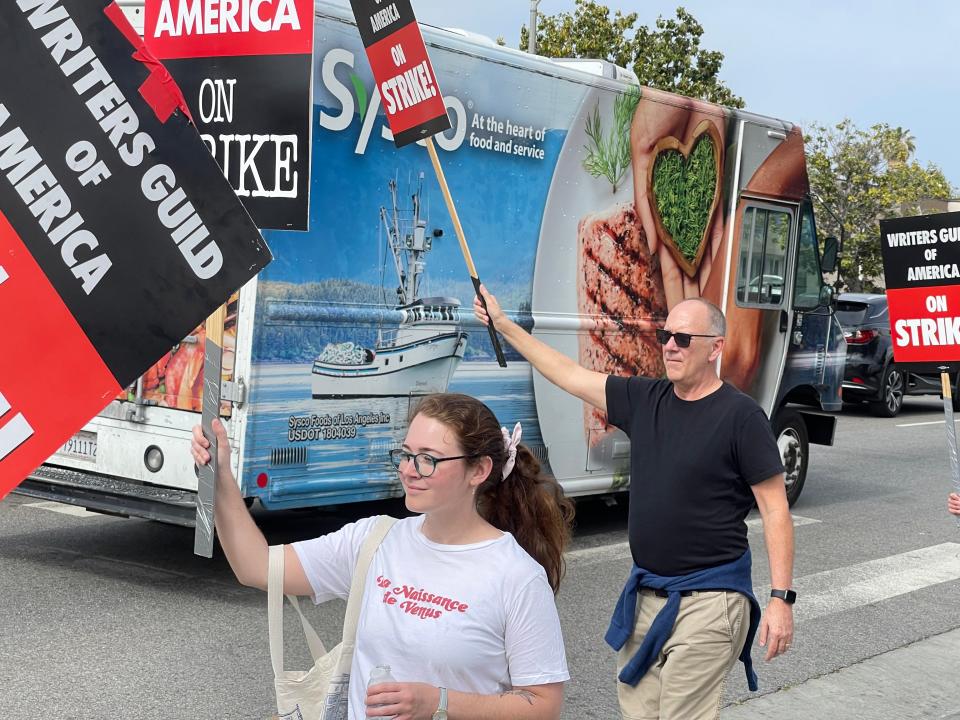Local writers, actor talk Hollywood strikes; what it could mean for Palm Springs film fest

While Hollywood is feeling the bulk of the strain of actors and writers on strike, the Coachella Valley, home to many in the industry, isn't immune to the impacts.
On May 2, the Writers Guild of America — which has roughly 11,500 members — went on strike over ongoing labor disputes with the Alliance of Motion Picture and Television Producers. Then on July 14, the actors' union SAG-AFTRA, comprised of 160,000 members, joined the writers, marking the first time in more than 60 years that both unions have hit the picket line simultaneously. Among the main issues union members are pushing for are increase in pay, changes to residuals as a result of streaming and limiting the use of artificial intelligence to generate content.
While the unions are on strike, members cannot work for struck companies or promote their work via interviews, festivals, award shows or on social media. Red carpet premieres for upcoming films have been scrapped for the time being, and events like the San Diego Comic-Con International were missing their biggest stars.
Many hope both strikes will be wrapped up this fall, just in time for movie awards season to begin, but negotiations could take longer. If, for example, strikes are still taking place in January, that could pose problems for the Palm Springs International Film Awards on Jan. 4, the annual celebration of the year's biggest stars and films. If actors cannot promote their work, that means no red carpet appearances or speeches, typical staples for the ceremony.
The Palm Springs film festival, scheduled Jan. 4-15, also often attracts stars for Q&As — actors Colin Farrell, Brendan Fraser and Anna Kendrick all joined in on the fun this year — but those sessions could be limited next year. Upcoming film festivals, such as Venice, Telluride and Toronto, are already preparing for star-less premieres and red carpets.
Officials with the Palm Springs International Film Festival declined to comment. Festival passes are still set to go on sale Aug. 1.
A changing landscape
Palm Springs residents David A. Lee and Daniel Vaillancourt are both WGA writers, and Vaillancourt is also a SAG-AFTRA member. The two have full-time professions in addition to their WGA and SAG work: Vaillancourt is the senior communications manager at DAP Health and a freelance entertainment writer for the Los Angeles Times, while Lee is an event photographer.
Before the strikes began, Lee said they were working on two projects, a documentary that was in the middle of negotiations with producers and a holiday movie. Even though they've received notes and suggestions from producers/production companies, they can't speak with them about either project or write for any struck company. But they can still "write on spec," or write for themselves with the hope that a project will be bought later on.

"When the strike ends, the market is glutted with these projects that writers have been writing on spec, and then there's bidding wars, especially with Christmas movies," Vaillancourt said. Their hope is that a company will buy their completed holiday script and shoot the project in October to be ready for a December release. But because actors are also on strike, with the possibility that they too may be out past October, that could put a wrench in their merry plans.
As many actors and writers have noted in recent weeks, streaming has contributed to a number of changes in the entertainment landscape, and the married duo has seen them, too. Vaillancourt explained that when he was doing background voice work for network television shows such as "The Blacklist," he would receive hundreds of dollars in residual checks from show reruns regularly, and still does though payments decline over time.
While there are some residuals with streaming content, the amounts are far less, and there are no reruns in the same sense as with network shows.
"When Mandy Moore says in streaming she’s getting a penny, that’s true because I’ve gotten checks for 35 cents," Vaillancourt said. "There was a life for these shows and for these movies after the fact (with reruns). Now there's not."
Similarly, Cathedral City resident Jasper Cole, who has been acting for 40 years and been in projects such as "Fall" and "Westworld," has seen changes with his own residuals over the years — he too has received checks for just a few pennies. But he's also seen it from the managerial side, which he has pursued for 20 years in addition to acting.
"I had a client who got a Netflix series and got a guarantee of seven episodes out of 10, making $17,500 an episode. That is great money," Cole said. However, that actor then had to relocate to Canada and rent an apartment there while still keeping their apartment in Los Angeles, pay Canadian taxes, as well as 10% of his income to his agent and others. "By the time it's all said and done, he maybe cleared $3,000 an episode. They offered a one-time $5,000 payment, which was supposed to cover residuals."
"When I throw around these numbers in conversations, it sound ludicrous," Cole continued. "People would say, 'Jasper, you guys are so spoiled, people would die to get $5,000 for a payment.' But he may not have another job the rest of the year."
The Alliance of Motion Picture and Television Producers did not respond to The Desert Sun's request for comment. But it stated in a July 17 press release that in its negotiations with SAG-AFTRA, it offered more than $1 billion in wage increases, pension and health contributions and residual increases over a three-year term. Additionally, AMPTP said it offered a 22% increase in residuals for high-budget SVOD (subscription video on demand) programs from Hulu, Disney+, Netflix and Amazon Prime, as well as a 76% increase in foreign residuals.
On the WGA side, AMPTP said in a May 4 statement: "In the most recent contract (2020), the WGA negotiated a 46% increase in residuals for streaming programs to take effect starting in 2022. ... The WGA’s proposal on foreign streaming residuals represents a 200% increase over current rates and treats foreign subscribers the same as domestic subscribers."
The popularity of streaming has also led to significantly smaller writers' rooms, Lee noted. He also has seen the number of TV episodes shrink, going from 22 episodes a season to anywhere between six and 10.
AI has been another hot topic in media recently, and one that both unions are fighting against. Writers fear that studios will turn to AI technology to write scripts and further lead to diminishing job opportunities, while SAG-AFTRA has said that studios want to scan background actors and use their likeness in other projects without their consent.
AMPTP said in press release that no digital replica of a performer can be created without their written consent and a description of the intended use. Later use of a replica is also prohibited unless a performer consents to its new use and is paid for it.
A May 4 AMPTP statement in regards to the WGA AI proposal states, "Writers want to be able to use this technology as part of their creative process, without changing how credits are determined, which is complicated given AI material can't be copyrighted. So it's something that requires a lot more discussion, which we've committed to doing." It added that the current WGA agreement defines a "writer" to exclude any "corporate or impersonal purveyor" of literary material, and that AI-generated material would not be eligible for writing credit.
While Lee and Vaillancourt believe these proposals show that studios don't see the value of actors or writers, Cole thinks AI shouldn't be a high-priority issue at the moment.
"We have been signing away our likeness on every contract we sign," Cole said. "Maybe I'm naïve about that, but that could be very simply settled by saying ... 'You can't recreate my image and use it without getting paid for it.'"

Like a majority of their fellow union members, the three valley residents hope to see significant changes with residuals, especially in streaming, and Cole is hoping for a cap on the minimum amount an actor needs to earn in a given year to receive health insurance (it is currently $26,470). All three shared that friends have struggled to reach that minimum because insurance rates have increased in recent years and residuals, what many depend on to secure that amount, have diminished.
Cole also expressed he would like to see changes among SAG-AFTRA leadership representation. While he said he supports current union president Fran Drescher, star of "The Nanny" in the 1990s, he described her as a "producer/showrunner first, actress second." He believes "a true middle-class actor" is needed who can relate to what a majority of actors are going through. Cole suggested Matthew Modine, from "Full Metal Jacket" and "Stranger Things," who previously ran for the union's presidential spot.
Overall, Cole said he is "cautiously optimistic" about what the strikes will amount to, but doesn't necessarily believe it will lead to a "huge reckoning" in the industry. Instead, he encourages everyone to "learn how to work cohesively with the studios" to make progress.
While they may be a bit far from Hollywood in the desert, all three have made it out to picket lines to stand in solidarity with their respective unions. Camaraderie, strength in numbers and uniting with one goal in mind have been highlights at the demonstrations, they said.

"It feels so good to be there to strike with fellow writers and strike these companies that have basically disrespected the writers for far too long," Lee said, who attended a WGA picket on May 19. "It's been great to see friends, to be there and work together for the common cause."
Ema Sasic covers entertainment and health in the Coachella Valley. Reach her at ema.sasic@desertsun.com or on Twitter @ema_sasic.
This article originally appeared on Palm Springs Desert Sun: Impacts of SAG, WGA strikes on Palm Springs film fest, local members

